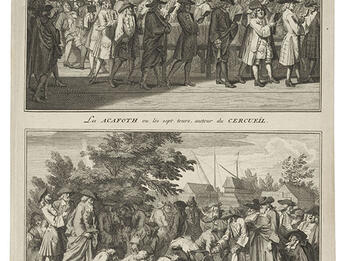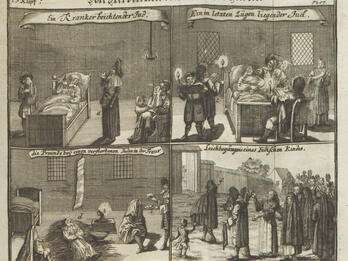Tsori la-nefesh u-marpe’ la-‘etsem (Balm for the Soul and Healing for the Bones)
To the princes and the honored ones, rulers of the people, the members of the charitable association in the ghetto of the holy community of Venice, may their Rock and Redeemer protect those who perform true lovingkindness [see Genesis 47:27] with the entire assembly of Israel, may the Almighty protect the nation blessed by the Lord.
News of the matter raised by your excellences has reached me, on several occasions. What possible justification could there have been, on so many occasions, for the community to be of a lesser standard in religiosity than all the nations surrounding us, in failing to be scrupulous, when one of our brethren is lying on a sickbed, about his entreating his Rock with confession and supplication regarding his iniquities and his transgressions. This is merely because the members of his family and those who love him—each of whom may be described as “a pious fool”—are afraid of frightening the invalid, to the point where many pass on to the next world without regret [for their deeds] and without repentance and without it having entered their mind that they have sinned against their God and that they ought to seek forgiveness from Him. Alternatively, they wait until the time when their strength has dissipated and weakened to such an extent that the individual in question is already in the throes of death and no longer has the breath remaining within him to enable him to continue expressing what he wishes to say. Besides this, a further consequence will flow—that [dying person] will not issue instructions to their households, or set their affairs in order, or leave behind them gifts for charity and sacred purposes—and numerous unfortunate things will ensue, one after the other.
And moreover, even if one of our brethren does summon three or ten men [to his bedside] and make confession in their presence, he merely spreads out [the standard confessional litany] and reads it out as one does a letter, and he fails to put into his heart either the knowledge or the understanding to focus with the requisite intent on the specific details of his sins. Wherefore you have offered a choice of dates in your association—the night of Tuesday, extending over into the commencement of Wednesday, the sixth of Tevet 5378 [1618], remained available—and you have found my heart faithfully committed to you to deal with this matter, whether by virtue of my obligation to provide service to your excellencies in regard to all sacred matters or whether to participate in the merit of the general public in a meritorious deed as great as this, or whether it is because I have suffered from faint-heartedness [see Jeremiah 8:18] for roughly these past two months over the passing of my intelligent and enlightened firstborn son, R. Mordechai of blessed memory, at the age of twenty-six, who made abundant supplications and confessions before his Creator for more than two hours at the time of his passing—neither psalms nor prayers of confession ceased to flow from his mouth until his soul departed with “One” [eḥad, the final word of the Shema‘]. And he taught the people the knowledge of what a man whom the [divine] Ruler desires to honor [see Esther 6:9] needs to do to bring such honor upon himself.
I said [to myself] that from this labor of mine, his soul too will derive satisfaction and that this merit will be granted to him—for his soul to bask in light, in the light of eternal life. Consequently, I have composed the following order of prayer, in accordance with the goodly hand of the Almighty upon me (Nehemiah 2:8), and in accordance with my limited intellect, albeit I also first showed it to my colleagues and friends in Torah.
I am confident that many people from the other holy communities in Italy will see [my compilation] and will adopt the same practice as we have done. I have also set forth before you psalms, biblical verses, and prayers to be recited when you walk about at night, and to protect the invalid when in the throes of death by accompanying his soul with the Name of the Lord, the God of Israel. May He shield His people from all pestilence and destructive forces; may He lead us with His counsel, and ultimately take us unto Himself in glory—after old age and hoary head, longevity, to walk before Him in the lands of [eternal] life!
The one who sighs and sorrows for his son
The insignificant man, Judah Aryeh of Modena.
When the confessor enters into the presence of the [dying] invalid, he should engage him in a limited amount of conversation regarding his illness, and should speak kindly to him. After that, he should say to him that it is good to give thanks to the Almighty and to pray to Him, as He is assuredly the true Healer. [ . . . ]
And, as our rabbis of blessed memory have stated: “Many failed to confess and died, and many others confessed and did not die”—and accordingly, may the Almighty heal him with a perfect healing:
And prior to everything else, he should exhort him to seek pardon of all those against whom he has sinned [ . . . ] and in the event that he may have in his possession money rightfully belonging to others, he should arrange to have [that money] returned. [ . . . ] And likewise, he should be exhorted to forgive anyone who has sinned against him [ . . . ] And he should then inform him that he is going to read out before him the standard litany of confession, word by word. [ . . . ]
And subsequent thereto, [the confessor] should begin to read out the litany of confession before him, word by word. [ . . . ]
And if [the invalid] is a woman, he should employ the appropriate feminine verbal forms.
Credits
Published in: The Posen Library of Jewish Culture and Civilization, vol. 5.




